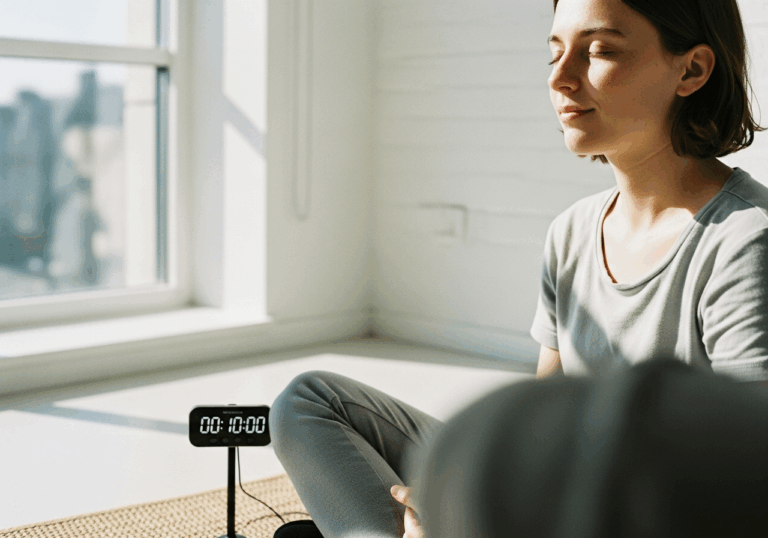Science-Backed Tips
Breathe Better, Sleep Better
15 minutes of slow breathing nightly improves sleep quality by 20%
📊 Did you know?
💡 Why It Matters
1️⃣
Improved sleep quality can enhance overall health and cognitive function.
2️⃣
Elevated cardiac vagal activity supports emotional resilience and reduces anxiety.
3️⃣
Better sleep patterns can lead to a 30% decrease in mood disturbances.
✅ Try These Micro-Tips
🎯
Practice slow-paced breathing for 15 minutes each evening.
🎯
Create a calming bedtime routine to enhance relaxation.
🎯
Limit screen time 30 minutes before bed to improve sleep onset.
🎯
Maintain a consistent sleep schedule to regulate your circadian rhythm.
📚 The study
The findings revealed a significant improvement in sleep quality, with participants experiencing approximately a 20% enhancement in their overall sleep patterns.
Additionally, there was an elevation in overnight cardiac vagal activity, which is crucial for emotional resilience and maintaining a calm baseline mood.
This study highlights the importance of integrating simple practices like slow breathing into our daily routines, especially in a world where social media often disrupts our sleep.
By prioritizing better sleep, individuals can not only enhance their overall health and cognitive function but also reduce anxiety and mood disturbances by up to 30%.
The implications of this research are profound, as improved sleep and vagal tone can support emotional well-being, making it essential for anyone looking to cultivate a more balanced and resilient lifestyle.
As we navigate the challenges of modern life, adopting slow breathing techniques may be a powerful tool for fostering better sleep and emotional health, paving the way for a calmer and more focused existence.
❓ Frequently Asked Questions ❓
Learn more
What is slow-paced breathing?
Slow-paced breathing involves taking deep, controlled breaths at a slow rate. This practice can help calm the mind and body, promoting relaxation and better sleep quality.
How long should I practice slow-paced breathing each night?
It is recommended to practice slow-paced breathing for 15 minutes each night. Consistency over 30 days can lead to significant improvements in sleep quality and emotional well-being.
What benefits does slow-paced breathing provide?
Slow-paced breathing can increase overnight cardiac vagal activity and improve sleep quality by approximately 20%. It also helps reduce anxiety and enhances emotional resilience.
How does slow breathing compare to social media use before bed?
Slow breathing is more beneficial for sleep and cardiac vagal activity compared to social media use. Engaging with social media can disrupt sleep patterns and increase arousal levels.
What is cardiac vagal activity (CVA)?
Cardiac vagal activity refers to the influence of the vagus nerve on heart rate and overall cardiovascular function. Elevated CVA is associated with better emotional regulation and reduced anxiety.
How can I create a calming bedtime routine?
A calming bedtime routine can include activities like reading, meditating, or practicing slow-paced breathing. Limiting screen time 30 minutes before bed is also essential for improving sleep onset.
What is the impact of improved sleep quality on overall health?
Improved sleep quality can enhance overall health and cognitive function. It is linked to a decrease in mood disturbances and better emotional stability.
How does maintaining a consistent sleep schedule help?
Maintaining a consistent sleep schedule helps regulate your circadian rhythm, making it easier to fall asleep and wake up. This consistency can lead to improved sleep quality and overall well-being.
What are the signs of improved sleep quality?
Signs of improved sleep quality include feeling more rested upon waking, experiencing fewer nighttime awakenings, and having a more stable mood throughout the day. You may also notice increased energy levels and better focus.
Can slow-paced breathing help with anxiety?
Yes, slow-paced breathing can help reduce anxiety by promoting relaxation and lowering baseline arousal levels. This practice supports emotional resilience and contributes to a calmer mood.





